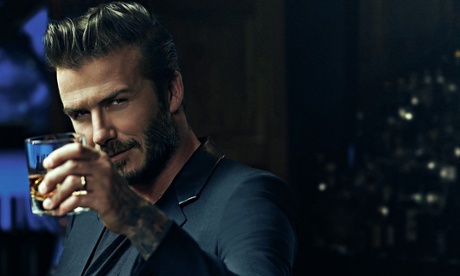
David Beckham’s TV ad for whisky brand Haig Club has been cleared by the UK advertising watchdog, despite complaints that the former footballer’s endorsement promotes drinking among children.
The commercial, from Sherlock Holmes director Guy Ritchie, features Beckham and a well-groomed group of trendy friends converging on what looks like a Highland estate to share a weekend and a tipple of scotch together.
As a global youth icon who spent most of his football career teetotal, Beckham’s appearance in the ad prompted a critical response from Alcohol Concern, which accused him of sending a “confusing message” about drinking to children.
The drinks charity was one of two complainants to the Advertising Standards Authority asking for the ad to be banned because it appealed to under 18s and implied that drinking was linked to social success or acceptance.
Drinks giant Diageo, a partner in Haig Club alongside Beckham and impresario Simon Fuller, said Scotch whisky appealed to adults aged over 25.
Diageo argued that Beckham had a strong appeal with the drink’s target market, primarily 25- to 40-year-old men, and that “he did not have a strong appeal to children and was not a person whose example children are likely to follow”.
The drinks company provided supporting arguments including the fact 76% of Beckham’s Facebook page subscribers were over 18, that his website and social media pages “had an adult look and feel to them”, and that the setting of the TV ad was “sombre and that the mood of the reunion was mature”.
The ASA disagreed with Diageo and said that as a recently-retired footballer, he would likely hold “general appeal” for some children.
However the ASA ruled that the 39-year old is simply too old to be popular enough with children to warrant banning the ad.
“We considered that, although Beckham’s early career would have meant that he held strong appeal to children at that time, the shift from football to commercial ventures, as well as his move to play in foreign leagues and subsequent retirement from football, meant that he was no longer likely to hold such appeal to children in 2014,” said the ASA.
“Because we considered that David Beckham did not have strong appeal to children and was not likely to be a figure whose example children would follow, we concluded that the ad had not breached the [UK advertising] code.”
The ASA added: “The ad did not imply that drinking was a key component of social success or acceptance, the success of a personal relationship or social event, or that refusal was a sign of weakness.”
The ad has been carefully crafted to preserve Beckham’s squeaky clean image.
For example, he is seen toasting but not actually drinking. And he also leads a responsible drinking programme which is “at the heart of the brand”.

